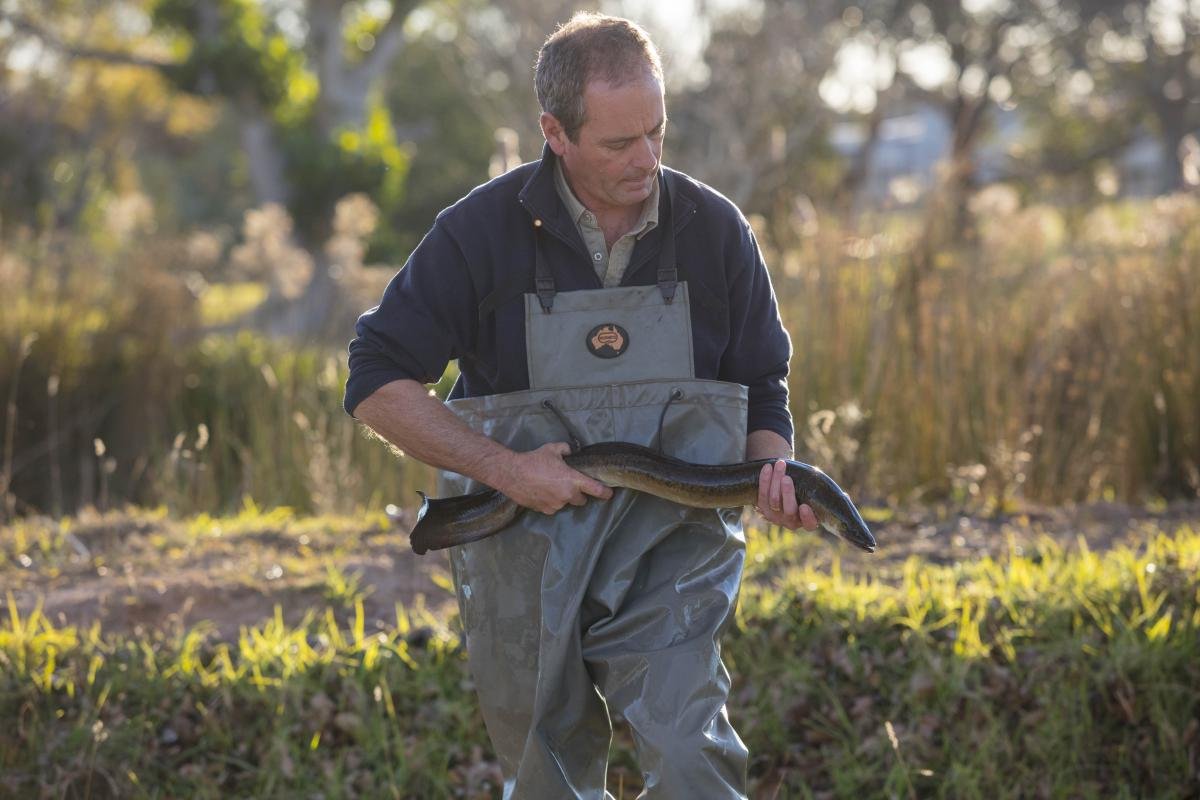Lachlan McKinnon - A first generation eel fisher
Based in Sale, Gippsland, Lachlan McKinnon has transformed from a fisheries scientist investigating and researching different aspects of fish biology and fisheries ecology into a first generation eel fisher. Born and bred in Melbourne, Victoria, Lachlan spent many school summer holidays hanging around the fishing boats at Queenscliff and Apollo Bay, scoring the odd day trip out to work cray pots and troll for couta. ‘I loved the idea of being able to catch and supply such fantastic food in Victoria, supplied by mother nature’.
‘As a kid, I used to dodge wayward golf balls and fish for shortfin eels in the billabongs at the Kew Golf Club, and in the Yarra River. Mum would cut them up into chunks and bake them in the oven at home for me’.
Around 12 years ago, Lachlan identified an opportunity to enter the commercial eel fishing industry in Victoria and grabbed it with both hands. ‘Eels are a fish that still have a great deal of mystery associated with them, in terms of their incredibly complex life cycle, despite being the subject of decades of research all over the world’, he says.
Lachlan developed a strong affinity with the eel industry in Victoria while working as a fisheries scientist with the Victorian Government, and had visited commercial eel fisheries in Europe and Asia. Attracted by both the opportunity to make a living from eel fishing, and the solitude that commercial fishing provides, Lachlan displays a real passion when talking about eels. ‘The different eel species and their respective fisheries all around the world share many things in common. One of the most fascinating things I've witnessed is how so many otherwise very different traditional indigenous cultures in different parts of the world have developed such very similar eel fishing techniques, and have evolved similar connections to eels. I find that very compelling’.
Lachlan has fished for eels in the Gippsland Lakes, Mallacoota Inlet, Tarwin, Tarra, Albert and La Trobe Rivers and many farm dams all around Sale. He goes with the flow when it comes to identifying where he will go fishing each week, enjoying the fact that every day is different. ‘Changes in temperature, time of year and moon phase all have a bearing on eel movement, including where, when and where eels will begin their seaward migration’.
While most eel fishers, including Lachlan work one-up, in places such as Lake Wellington, it pays to have a deckhand work the gear whilst Lachlan stops the boat from sinking when the wind picks up.
Lachlan uses fyke nets to catch eels, working his equipment in the early hours of the morning whilst most of us are still sleeping. These are collapsible, conical nets, usually up to 7m long and approximately 400-600mm diameter, containing 2-3 internal funnels. Most fyke nets have one wing, or leader, at the front of the net which extends out another 7-10m and guides eels into the net. Fyke nets are generally set with the wing staked close to the shore or river bank, and then shot perpendicular to the shore with a stake or weight used to hold the cod-end. Eels moving along the shore or close to the river bank then follow the wing down into the net. Baiting the nets can also help, but is not necessary.
Eels are best kept and supplied to markets live, so once caught, the eels are safely secured in wet mesh bags before being transported in aerated tanks and held in land-based recirculated or flow through tank systems. Lachlan supplies his eels to fish markets in Melbourne and Sydney, whilst some of his product is exported into Asia.
Lachlan loves to eat eels. ‘Eels are amazing to eat, but very underrated here in Australia. My preferred cooking method is to de-slime, gut, then smoke the eel whole, or butterfly-fillet and grill over charcoal, as is common in Korea and Japan. Victoria has probably the most sustainable eel fishery anywhere in the world. Eels are delicious and I encourage everyone to try them. You never know, you might just love the taste of eels as much as I do’.


